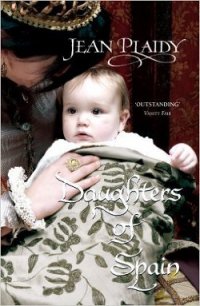Katharine, The Virgin Widow - Plaidy Jean (книга регистрации .txt) 📗
“And why not?”
“He is but a boy.”
“A little younger than yourself. When he is a little older that will be of small account.”
Henry! Katharine was startled and a little afraid. She wanted to escape from Elvira, to think about this project.
That night she could not sleep. Henry haunted her thoughts and she was not sure whether she was pleased or afraid.
She waited for more news of this, but none came.
It was so difficult to know what was happening at home. There were only fragments of news she heard now and then. The war for Naples, in which her parents were engaged against the King of France, was not going well for them. That, she believed, was why the King of England was hesitating over her betrothal to his son. If the Sovereigns were in difficulties he could make a harsher bargain with them. He did not forget that only half her dowry had been paid.
So the months went by without much news. She found that she had very little money—not even enough to pay her servants. She was worried about Maria’s dowry, for there was no news from Spain about this.
The King of England said that she had no right to a third of the property of her late husband, because the second half of her dowry had not been paid. She needed new dresses, but there was no money to buy any. There was her plate and jewels, which represented thirty-five thousand crowns; could she pawn these? She dared not do so because she knew that they had been sent from home as part of her dowry; but if she had no money, what could she do?
There were times when she felt deserted, for she was not allowed to go to Court.
“She is a widow,” said the King of England. “It is well that she should live in seclusion for a while.”
Henry had his eyes on the Continent. It might be that, as the French seemed likely to score a victory over the Spaniards, a marriage for his son with France or with the House of Maximilian might be more advantageous than one with Spain.
Meanwhile, living in England was the daughter of Isabella and Ferdinand—a Princess, but penniless, a wife but no wife, virtually a hostage for her parents’ good behavior.
It was no concern of his that she suffered poverty, said the King. He could not be expected to pay an allowance to the woman whose dowry had not been paid.
Puebla came to see her, shaking his head sadly. He also had received no money from Spain. It was fortunate that he had other means of making a living in England.
“They are using every maravedi for the wars, Highness,” he said. “We must perforce be patient.”
Katharine sometimes cried herself to sleep when her maids of honor had left her.
“Oh, Mother,” she sobbed, “what is happening at home? Why do you not send for me? Why do you not bring me out of this…prison?”
* * *
IT WAS ALMOST CHRISTMAS. A whole year, thought Katharine, since she had come to England, and during that time she had married and become a widow; yet it seemed that she had been a prisoner in Durham House for a very long time.
She was not to join the Court at Richmond for the Christmas celebrations: She was a widow, in mourning. Moreover the King of England wished the Spanish Sovereigns to know that he was not showering honors on their daughter, since half her dowry was still owing to him and he was not very eager to make a further alliance with their House.
Maria de Rojas was fretful. “No news from home?” she was continually demanding. “How strange that the Queen does not answer your request about my marriage.” Maria was anxious, for shut up in Durham House she had no opportunity of seeing her lover. She wondered what was happening to him and whether he was still eager for the marriage.
Francesca declared that she would go mad if they had to remain in England much longer; even gentle Maria de Salinas was restive.
But the days passed, all so like each other that Katharine almost lost count of time except that she knew that with each passing week she owed the members of her household more and more, and that Christmas was coming and they would have no money for celebrations, for gifts or even to provide a little Christmas cheer for their table.
It was in November that Queen Elizabeth came to Durham House to call on Katharine.
Katharine was shocked when she saw Elizabeth, because she had changed a great deal since they had last met. The Queen was far advanced in pregnancy and she did not look healthy.
The Queen wished to be alone with Katharine, and as they sat together near the fire, Elizabeth said: “It distresses me to see you thus. I have come to tell you how sorry I am, and have brought food for your table. I know how you have been placed.”
“How kind you are!” said Katharine.
The Queen laid her hand over the Infanta’s. “Do not forget you are my daughter.”
“I fear the King does not think of me as such. I am sorry the dowry has not been paid. I am sure my parents would have paid it, if they were not engaged in war at this time.”
“I know, my dear. Wars…there seem always to be wars. We are fortunate in England. Here we have a King who likes not war, and I am glad of that. I have seen too much war in my life. But let us talk of more pleasant things. I could wish you were joining the Court for Christmas.”
“We shall do well enough here.”
“I envy you the quiet of Durham House,” said the Queen.
“Tell me when your child is expected.”
“In February.” The Queen shivered. “The coldest month.”
Katharine looked into the face of the older woman and saw there a resigned look; she wondered what it meant.
“I trust you will have a Prince,” Katharine murmured.
“Pray that I may have a healthy child. I have lost two at an early age. It is so sad when they live a little and then die. So much suffering…that one may endure more suffering.”
“You have three healthy children left to you. I have never seen such sparkling health as Henry’s.”
“Henry, Margaret and Mary…they all enjoy good health, do they not? My life has taught me not to hope for too much. But I did not come to talk of myself, but of you.”
“Of me!”
“Yes, of you. I guessed how you would be feeling. Here you live almost a prisoner, one might say, in a strange country, while plans are made for your future. I understand, for I have not had an easy life. There has been so much strife. I can remember being taken into the Sanctuary of Westminster by my mother. My little brothers were with us then. You have heard that they were lost to us…murdered, I dare swear. You see, I have come to tell you that I feel sympathy for you because I myself have suffered.”
“I shall never forget how kind you are.”
“Remember this: suffering does not last for ever. One day you will come out of this prison. You will be happy again. Do not despair. That is what I have come to say to you.”
“And you came through the cold to tell me that?”
“It may be my last opportunity.”
“I hope that I may come and see you when the child is born.”
The Queen smiled faintly and looked a little sad.
“Do not look like that,” Katharine cried out in sudden panic. She was thinking of her sister Isabella, who had come back to Spain to have her child, the little Miguel who had died before he was two years old. Isabella had had some premonition of death.
She expected some reproof from the Queen for her outburst, but Elizabeth of York, who knew what had happened to the young Isabella, understood full well the trend of her thoughts.
She stood up and kissed Katharine’s brow. That kiss was like a last farewell.
* * *
IT WAS CANDLEMAS-DAY and the cold February winds buffeted the walls of the Palace of the Tower of London, although the Queen was unaware of them.
She lay on her bed, racked by pain, telling herself: It will soon be over. And after this, should I live through it, there cannot be many more. If this could be a son…if only this could be a son!




